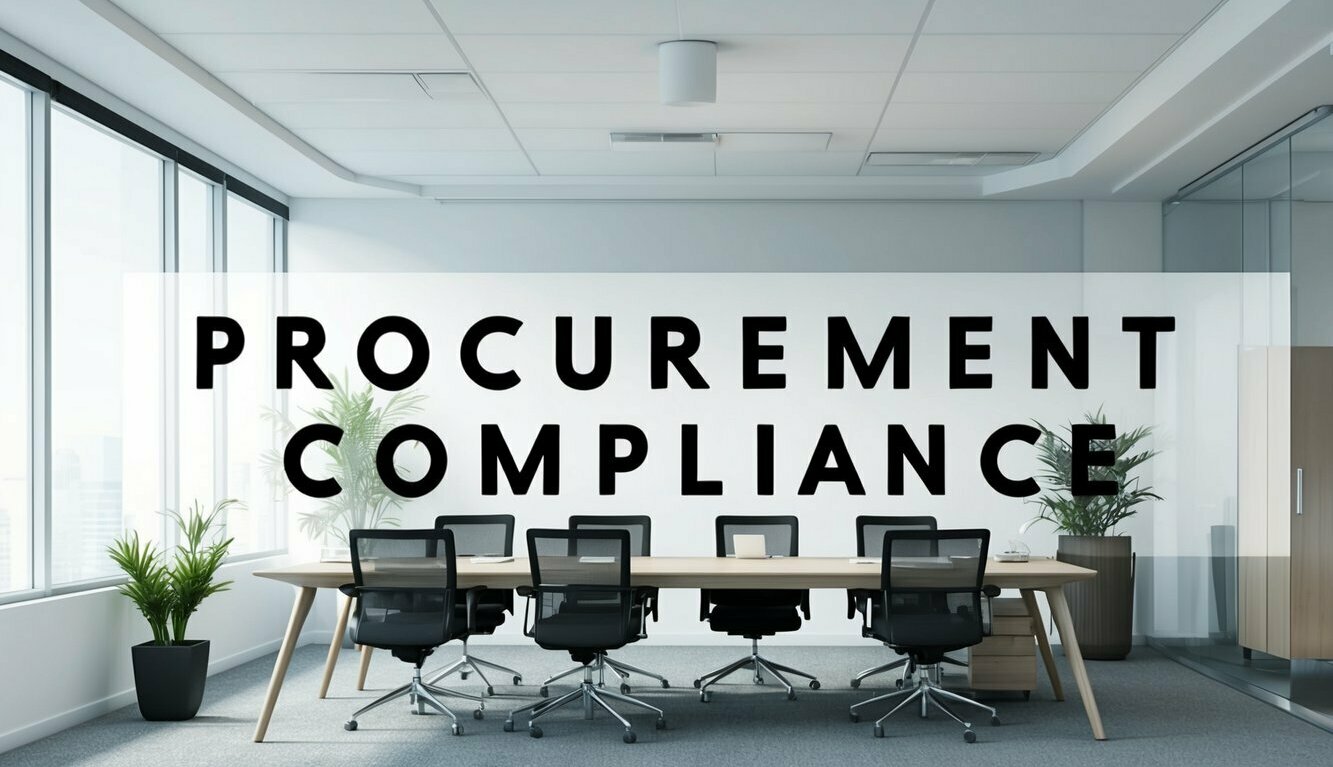Understanding Procurement Fraud
Procurement fraud is a serious issue that can affect any organisation involved in buying goods and services. It includes various types of schemes that manipulate procurement processes for personal gain. Recognising different types, mechanisms, and warning signs is crucial for safeguarding public resources.
Definition and Scope
Procurement fraud involves dishonest practices when acquiring goods or services. It can occur in both public and private sectors. This type of fraud can include activities like bribery, kickbacks, and forged invoices.
The scope of procurement fraud can be wide, affecting everything from small organisations to large government agencies. You need to understand that it is not just one-off incidents. Instead, it is often part of a larger pattern of unethical behaviour that can lead to significant financial losses and damage reputations.
Suppliers Perspective
As a supplier involved in public sector procurement and tendering you also have a responsibility when it comes to procurement fraud. Public sector suppliers can avoid procurement fraud, including bid rigging, by:
- Ensuring AI bid software is sense checked to ensure only the use of accurate and verified data.
- Conducting thorough due diligence on partners and subcontractors to prevent collusion and bid rigging.
- Maintaining transparency in all bid submissions and adhering strictly to procurement regulations.
- Implementing internal controls to monitor and review bids, ensuring compliance with truthfulness and accuracy.
- Reporting any suspicious activity related to bid rigging to the proper authorities.
- Training staff on recognising and preventing procurement fraud and unethical practices, even when using advanced technologies.
Types and Mechanisms
There are several common types of procurement fraud, including:
- Corruption: This includes bribing officials for contracts or favours.
- Invoice Fraud: Fake invoices are created for goods or services not delivered.
- Bid Rigging: Contractors may collude to manipulate bidding processes for contracts.
- Conflict of Interest: Individuals may benefit personally from procurement decisions.
The mechanisms can vary. For instance, some fraudsters submit low bids to gain contracts, planning to later increase costs through amendments. This manipulation undermines fair competition and economic integrity.
Indicators and Red Flags
There are several indicators that can signal procurement fraud. These include:
- Unexplained Cost Increases: Sudden hikes in prices should raise concerns.
- Irregularities in Bidding Procedures: Look for a lack of transparency or unusual winning bids.
- Frequent Changes in Supplier Contacts: Changes can indicate conflicts of interest.
- Patterns of Inconsistent Billings: Check for discrepancies in invoicing.
Being vigilant about these red flags can help you identify potential fraud before it causes serious damage. Regular audits and strong reporting mechanisms are essential in detecting and preventing these schemes.

Mitigation Strategies
To effectively tackle procurement fraud, focus on preventative measures, detection techniques, and transparent response actions to ensure you safeguard your organisation against potential risks.
Preventative Measures
Policies and procedures should be clear, make relevant to all roles who also should attend training to prevent procurement fraud. Start by establishing a clear code of conduct that outlines acceptable behaviour for employees and suppliers. Ensure that all staff receive training on ethics and compliance.
Regularly conduct background checks on suppliers to assess their credibility. You can also create a system for reporting suspicious activities anonymously. Furthermore, maintaining a separation of duties is vital; ensure that no single person has control over the entire procurement process. This makes it harder for fraud to occur unnoticed.
Detection Techniques
Monitoring and auditing are key to identifying potential fraud early. You should regularly review procurement records for irregularities, such as inflated invoices or unusual payment patterns. Employ data analytics to spot trends that may indicate fraudulent activity, as well promotion of and monitoring of conflicts of interest.
You should also encourage your team to remain vigilant and report any red flags. Establishing clear criteria for evaluating suppliers can also help in identifying inconsistencies.
Response and Remediation
When fraud is detected, swift action is essential. Develop a response plan before an incident occurs to streamline your actions. This plan should include roles, responsibilities, and communication strategies for internal and external stakeholders.
After addressing the immediate threat, conduct a thorough investigation to understand how the fraud occurred. This helps in preventing future incidents. Implement changes based on your findings, such as updating policies or improving training. You may also need to consider legal action against the offending party to recover losses and deter future fraud.

Procurement Fraud for Bidders & Public Sector Suppliers
Procurement fraud can severely undermine the fairness of public sector contracts and be very frustrating for businesses who have taken the time and effort to bid for the contracts. Bidders should proactively request comprehensive feedback from contracting authorities if they suspect any irregularities in the procurement process. The UK Procurement Act empowers bidders to challenge fraudulent practices, and they can escalate concerns to the Procurement Review Service for formal investigation. Challenging procurement decisions is the bidders way of forcing a fair, open and transparent process, therefore reducing fraud.
Entitlement to Feedback in Public Sector Tenders
Bidders in public sector tenders have the right to request feedback, particularly if they were unsuccessful. This entitlement allows bidders to understand how their submission was evaluated, helping them improve future bids. Feedback can include details into how the tender was scored against the criteria, reasons for not winning, and areas for improvement. Understanding this feedback helps suppliers and bid managers aiming to refine their approach and improve their chances of success in future procurement opportunities.
Prefer to discuss?
Contact usProcurement Frauds: Emerging Trends and Recent Case Studies
Procurement fraud remains an ongoing challenge for organisations, as fraudsters continually adapt their methods to exploit new opportunities and weaknesses. By understanding recent trends and examining real-life cases, organisations can better protect themselves from these risks and safeguard their procurement processes.
One notable development is the rise of cyber-facilitated procurement fraud. As procurement increasingly shifts online, fraudsters exploit digital vulnerabilities to alter bids, manipulate payment information, or create fake suppliers. Strengthening cybersecurity measures, such as secure procurement platforms and regular security audits, can help reduce these risks significantly.
Another growing concern is greenwashing, where suppliers misrepresent their environmental credentials to secure contracts. With sustainability becoming a key procurement factor, organisations must verify supplier claims carefully to avoid unintentionally supporting deceptive practices. Regular audits, verification certifications, and independent assessments of suppliers' environmental standards can minimise this risk.
Additionally, as global supply chains become more complex, the potential for fraud through counterfeit or substandard goods increases. Fraudsters exploit the difficulty in monitoring intricate supply chains to introduce fake or inferior products, potentially harming end-users and damaging reputations. To counteract this, organisations should regularly audit their supply chain partners, conduct detailed due diligence, and implement robust product traceability systems.
Recent procurement fraud cases illustrate the reality of these risks. For example, during the COVID-19 pandemic, urgent demand for personal protective equipment (PPE) led to expedited and often compromised procurement processes. Transparency International UK identified over 130 high-risk contracts worth billions that raised red flags for corruption, including conflicts of interest and a lack of competition. The UK government later revealed that nearly £10 billion worth of PPE was unusable or substantially devalued, underscoring the risks associated with rushed procurement.
In another instance, an army quartermaster was convicted for stealing almost half a million pounds worth of supplies from the Ministry of Defence (MoD). The individual exploited gaps in internal controls, highlighting the need for rigorous audits, transparency, and accountability within organisations, particularly in roles with direct procurement responsibilities.
'Bid rigging' also remains a persistent risk. Recently, the Competition and Markets Authority (CMA) fined several UK construction companies nearly £60 million for colluding to rig bids on public sector contracts. This practice inflated project costs, reduced genuine competition, and weakened trust in procurement processes. It reinforced the importance of robust procurement oversight, clear and transparent tendering procedures, and vigilant monitoring for suspicious bidding patterns.
To protect against these evolving procurement fraud risks, organisations should invest in improved digital security, diligently verify supplier claims, closely monitor their supply chains, and ensure compliance with robust procurement policies. Through increased awareness and proactive measures, organisations can significantly reduce their vulnerability to procurement fraud, safeguarding their reputation, finances, and operational integrity.

Legal and Regulatory Framework
Understanding the legal and regulatory framework surrounding procurement fraud is important whether you are a procurement manager or part of the supply chain. This includes the national laws that define fraud and impose penalties, as well as international agreements that guide best practices.
National Laws and Penalties
In the UK, procurement fraud is addressed by various laws such as the Fraud Act 2006 and the Bribery Act 2010. These laws define fraudulent actions and outline the penalties for those found guilty.
Key aspects include:
- Fraud Act 2006: This act makes it illegal to obtain goods or services by deception. Penalties can include imprisonment for up to 10 years.
- Bribery Act 2010: This law makes bribery an offence and includes severe penalties. Individuals and companies can face significant fines and prison sentences.
Local governments and public sector organisations may have additional regulations to follow, aimed at preventing procurement fraud. Understanding these laws helps you recognise what actions are considered illegal and the consequences of those actions.
International Agreements and Protocols
The UK is also involved in various international agreements that combat procurement fraud. These agreements provide a framework for countries to work together in tackling fraud on a global scale.
Notable agreements include:
- United Nations Convention against Corruption (UNCAC): This treaty urges countries to implement measures to prevent corruption in public procurement.
- OECD Guidelines for Fighting Corruption: These guidelines provide best practices for transparency and accountability in public sector procurement.



